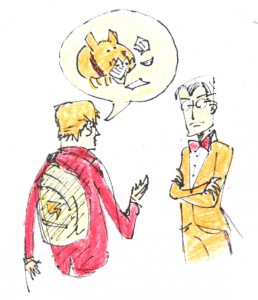It’s two in the morning — you’ve just spent an unsettling number of hours desperately willing your brain to absorb countless formulas, dates and other random facts, shuddered through a Danforth dinner and hit the books all night only to realize that, oops, you still haven’t done that one assignment that you swore you would do the night before (but that barty was the barty of all barties and couldn’t be missed).
Starting that paper/lab/million-paged book is simply out of the question, so what do you do?
Since UR students are in fact human and therefore not nocturnal animals or robots, you probably allow yourself to sleep — but not until you’ve thought of a suitable excuse to tell your professor.
Students will frequently ask professors for extensions on assignments, citing a wide range of reasons, many of which are completely legitimate. Other huge assignments, sports commitments, religious holidays and life in general can get in the way of completing schoolwork, and there are only so many conscious hours in a day to finish it all.
More often than not, professors are sympathetic to our pleas of mercy for flexibility with a due date — after all, they are human and were most likely stressed students once too.
In fact, Maryann McCabe, a senior lecturer in the Department of Anthropology finds that students who directly ask for an extension (rather than simply neglecting to hand in an assignment without an explanation) are being respectful and responsible, demonstrating a commitment to their schoolwork.
She doesn’t tend to see these excuses or exceptions negatively and is comfortable “fitting things in whenever.”
“I realize that my class is generally taken as an elective and other classes’ work may sometimes take precedence,” she said.
In her eyes, the date that an assignment is actually handed in is not important as long as it is eventually completed. Her reasoning is that students are telling the truth when they supply reasons for being pressed for time, and her own busy schedule can leave little time for grading assignments promptly.
Anthropology Professor John Osburg is also forgiving of his students, reasoning that he “has memories of being in the same position.” However, he is wary of students’ habits of frequently asking for extensions.
He has also picked up on certain tropes in students’ excuses for late work, such as strategically vague references to a disturbing event that has rendered the student in a “fragile emotional state” and consequently unable to work effectively.
He explained that these “incidents” are almost always referenced in the context of a sorority dilemma, but never within a fraternity. In fact, Osburg noted that it is almost exclusively girls who ask for extensions, and boys simply hand in work late with no accompanying excuse.
“Another interesting pattern is that a much smaller number of students are apologetic,” he said.
He notes that, instead, these students seem to expect a refusal of an extension, writing in their requests assurances that they “would never usually ask for an extension, but…” and even, “I understand if you don’t want to grant me an extension…”
As college students, we may have evolved from the dog-eating-homework excuse, yet still rely on extensions and leniency from professors to salvage sleep, sanity and GPAs.
Some of us are more comfortable asking for leeway than others, and certainly some professors are more likely than others to grant it. The student-professor relationship is based on some level of trust, which can be violated if a student takes advantage of a professor’s generosity or compassion.
So, next time you decide to spend an evening looking up humorous political cat memes online instead of writing that paper because you figure you can plead your way to an extension, think twice. Because your professor probably won’t be able to relate to that.
Ganeles is a member of
the class of 2015.



